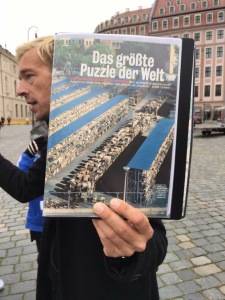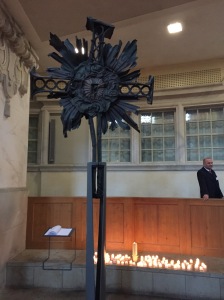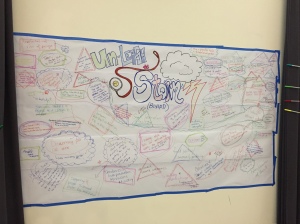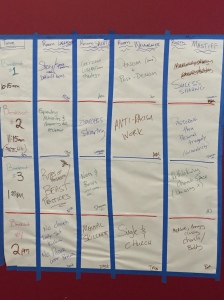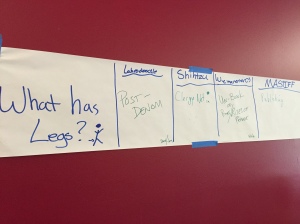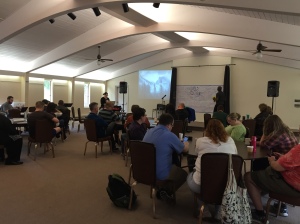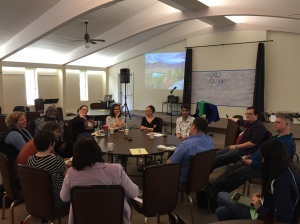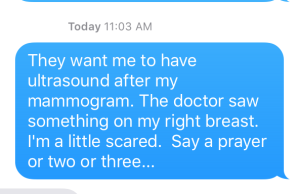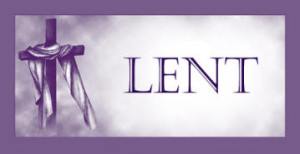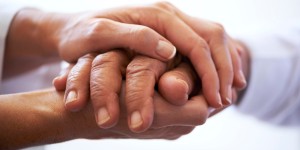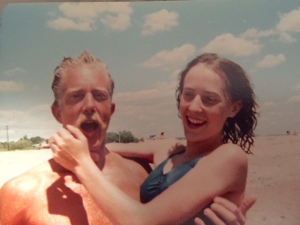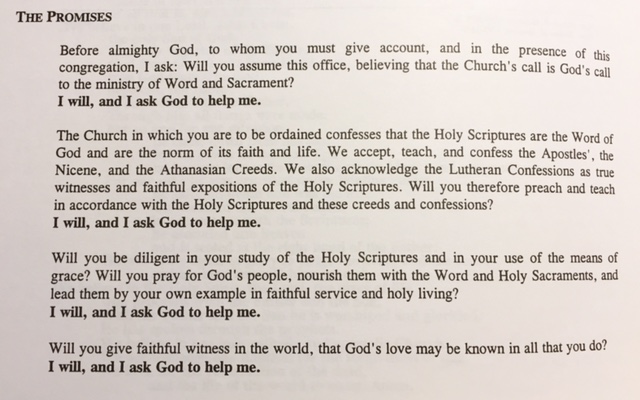Last month I took the trip of a lifetime – at least for me. As a 50th birthday present my husband gifted me with a Lutheran Church nerd’s dream – a “footsteps of Martin Luther” tour.
What surprised me though was that of all the things I saw and places I went, what moved me the most had really no direct connection to Martin Luther at all. It was in the city of Dresden – specifically, the Frauenkirche (Church of our Lady). The Frauenkirche had been one of the focal points of the city until it, and much of the Dresden, was destroyed in the allied firebombing of February of 1945 during World War II. Only two small sections of the building remained upright. And while some of the city was rebuilt after the war, the East German government which had control over Dresden decided to let the church remain in ruins as a memorial against war. Here is how the church looked for FORTY FIVE years.
Before the Berlin Wall came down and Germany was unified, there was talk of rebuilding the church, but after the Wall came down, plans moved forward rapidly. The people wanted the Frauenkirche back! And not only did they want to rebuild it – they wanted it rebuilt exactly the way it was – and they decided to use as many of the original stones as possible. In the square around the church, each stone was examined to find out if it was still structurally sound, and then marked so it could be determined the place it once held in the building. In the picture on the right, our guide was showing us a magazine cover story from the time that illustrated just how complicated a process it was. Can you imagine the effort put forth to do this? I was amazed. More than amazed. I was utterly moved by the determination and devotion of the people involved in this massive project. It is a testament to the people’s faith and persistence that this building would rise from the ashes and rubble to proclaim God’s glory. A literal resurrection. I was speechless before I ever walked in. The picture below is what the Frauenkirche looks like today.
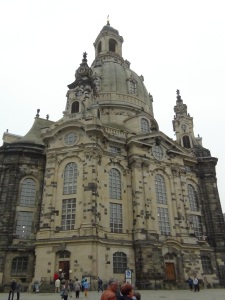 Because the church was made of sandstone, which darkens as it ages, you can easily tell the original stones that survived the bombing. The dark stones are original, put back in the places they once occupied before the bombing, while all the lighter stones are new. In a few hundred years we won’t be able to tell the difference, which is at once joyous and sad, in my opinion. The healing of wounds is a wondrous achievement and gift, but to stand tall with scars is a testament to strength and faith. I’m glad that the church has a museum which tells the story of its destruction and rebuilding as well as a monument in the worship space itself, which will continue to tell its story, long after the war torn stones and those crafted afterwards are indistinguishable.
Because the church was made of sandstone, which darkens as it ages, you can easily tell the original stones that survived the bombing. The dark stones are original, put back in the places they once occupied before the bombing, while all the lighter stones are new. In a few hundred years we won’t be able to tell the difference, which is at once joyous and sad, in my opinion. The healing of wounds is a wondrous achievement and gift, but to stand tall with scars is a testament to strength and faith. I’m glad that the church has a museum which tells the story of its destruction and rebuilding as well as a monument in the worship space itself, which will continue to tell its story, long after the war torn stones and those crafted afterwards are indistinguishable.
The inside of the church was also rebuilt exactly as it had been, or as close to “exact” as humanely possible. While its Baroque style wouldn’t usually move me, it was impossible for me NOT to be moved by the incredible attention to detail, the bright pastel colors, and the stunning dome. I entered, like most of the tourists, and took picture upon picture. I AM that tourist. But I am also a person of faith. So after walking around respectfully and quietly (as did all those present, we were in a church after all) – after taking it all in, I sat in a pew to pray.
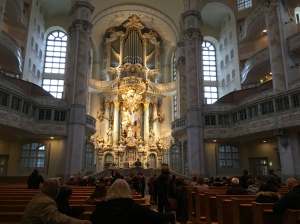 I prayed in almost every church I visited on this trip, except when we were ushered through quickly by tour guides. But the Frauenkirche was the end point of the tour that day. There was nowhere I had to go. So I sat – and prayed – and sobbed.
I prayed in almost every church I visited on this trip, except when we were ushered through quickly by tour guides. But the Frauenkirche was the end point of the tour that day. There was nowhere I had to go. So I sat – and prayed – and sobbed.
I sobbed for the thousands who died in the firebombing. I sobbed for the horror of war and the lessons stubborn humanity has yet to learn. I sobbed for 45 years of ruins and rubble. I sobbed for the struggle and perseverance of the people under the East German government. I sobbed for the sheer tenacity of the people determined, not just to rebuild, but to rebuild it as it was. I sobbed for those who did not live to see this house of God rise again. And I sobbed for my own life’s pains, that in comparison seemed so small. Yet I also sobbed for the backbreaking work I have done (and continue to do) with God’s grace as my strength, to rise from the rubble and stand.
In that sobbing moment, the Frauenkirche became a symbol for me, a symbol of the resurrection. Of course the resurrection of Christ is God’s power pure and unaided, while the Frauenkirche’s resurrection was the work of the people – but it was work inspired and empowered by God. Indeed, I felt God ALL around me in that place, in a way difficult to explain, and in a way I have felt in very few other places in my life. It’s as if the space embraced ALL the pain and joy of human life simultaneously. I honestly did not want to leave, and I didn’t for a long time.
Near the church’s exit is the monument I alluded to a few paragraphs above. It is the original spire which adorned the top of the steeple. It’s a twisted mass of metal, melted and crushed by the heat and debris of those February days in 1945. At its base, people leave candles which say “peace be with you.” There can be no more profound sentiment with which to leave this sacred space than peace; a deep well of God’s peace despite all the horror that happened there. In addition to this peace of God, I also left the Frauenkirche with a new commitment to “worldly” peace – a resolve to bring an end to rubble and ruin, to the evil we humans are capable of inflicting upon one another. For both the peace of God and worldly peace will never condone evil – indeed, the hope of peace inspires us to work for peace.
The Frauenkirche has changed me, profoundly. I believe I’ll be figuring out the “how” of that change for the rest of my days…

